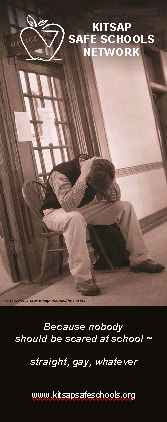|
|
|
|
|

|
|
|
Kitsap Safe Schools Network
Because
nobody should be scared at school ~
straight, gay, whatever
|
|
|
|
|
|
|
 |
WORKSHOPS
& GSA SUPPORT
VIDEOS & CURRICULA
POSTERS & STICKERS |
|
The
Kitsap Safe Schools Network is a partnership
of school and community groups, churches, youth groups,
parents and individuals working to protect every
child from bullying at school, especially bullying
based on perceived sexual orientation and gender identity. We provide:
| CLASSROOM
PRESENTATIONS &
MATERIALS If
you need a classroom presentation, curricula, videos, books, and
posters that teach students and staff about GLBTQ issues in
age-appropriate ways, contact us! * |
| TRAINING — If
you or your staff want help making your school climate
more respectful toward sexual minority students, if
you want to organize a bullying workshop, contact us! * |
GSA SUPPORT
— We can provide materials and financial support for
GSA activities. If you don't have a Gay
Straight Alliance at your school, we can help get
one started.
YOUTH EVENTS SUPPORT
— We sponsor and provide financial support for youth events for which
LGBTQ youth provide leadership, such as the Kitsap Youth Rally for
Human Rights and the Pink Prom. |
| COUNSELING — We
help fund counseling for students and their families
with respected community therapists. |
COMMUNITY EDUCATION
— We have research findings and reports to share with
colleagues and parents.
*Kitsap Safe Schools cannot provide in-person training and support while there is a risk of coronavirus transmission |
|
|
|
|
|
|
|
Kitsap
Safe Schools
Intervention |
|
Research on
Anti-Gay Bullying |
If
you, your child or your students are having a problem with anti-gay
bullying at school and you want help solving the problem, contact us!
WHAT IS AN INTERVENTION? 
It is a way for a student, parent or educator to get help with anti-gay
bullying or harassment. A trained volunteer will help you decide what
to do next. If you need it, we will
- meet with your principal
- meet with your parents
- review your school’s policies
- provide training for your school
- find other resources to support you
Your wishes and safety are our only concern, and will guide any intervention. |
|
U.S.
middle and high schools remain hostile environments for many lesbian, gay,
bisexual, transgender, queer and questioning (LGBTQ) students,
according to GLSEN’s National School Climate Survey. GLSEN's report, which documents school climate, its effects on
student outcomes and the availability and benefits of school-based
supports for LGBTQ students, also shows significant signs of
improvement in these areas since 2001.
Their research provides
further evidence for the positive effect of school-based supports –
comprehensive anti-bullying policies, Gay-Straight Alliances (GSAs),
supportive educators and LGBT-inclusive curriculum – on LGBTQ students’
experiences with harassment and discrimination and, ultimately, their
educational outcomes. Although many LGBTQ students still experience
harassment and discrimination, these supports can be vital for
transforming school climates and helping all students thrive.
LGBTQ students in schools with more positive school climates were at lower risk of suicidality and reported fewer depressive symptoms compared to students in less positive school climates.
GSAs
are spaces for LGBTQ+ students to provide support and foster
healing for each other, to grow awareness of LGBTQ+ issues in their
schools and communities, and work to improve their school climate.
When
LGBTQ+ students are able to be who they are without worrying about
harassment, it allows them to focus on doing their best and to thrive
in school.
GLSEN also has found:
Most LGBTQ students have experienced harassment and discrimination at school.
Over eight in 10 (85 percent) experienced verbal harassment based on a
personal characteristic, and nearly two thirds (66 percent) experienced
LGBTQ-related discrimination at school. Due to feeling unsafe or
uncomfortable, nearly a third (32 percent) of LGBTQ students missed at
least one day of school in the last month, and over a third avoided
bathrooms (39 percent) and locker rooms (38 percent).
Hostile school climates negatively affect LGBTQ students’ educational outcomes and mental health.
LGBTQ students who experienced high levels of anti-LGBTQ victimization
were twice as likely to report they do not plan to pursue
post-secondary education. Also, LGBTQ students who experienced high
levels of anti-LGBTQ victimization and discrimination had lower GPAs,
lower self-esteem and higher levels of depression.
The majority of LGBTQ students report hearing biased remarks from school staff,
and school staff often fail to intervene when they hear these remarks
at school. Most LGBTQ students report that they’ve heard homophobic
remarks (56 percent) and negative remarks about gender expression (64
percent) from school staff. There was also a decrease in school staff's
frequency of intervention in these types of remarks from 2013 to 2015.
School-based supports, often still lacking but generally growing in availability, have a positive effect on school climate.
LGBTQ students in schools with a GSA or a comprehensive anti-bullying
policy experienced lower levels of anti-LGBTQ victimization. Also,
LGBTQ students with an LGBT-inclusive curriculum were more likely to
report that their classmates were somewhat or very accepting of LGBTQ
students (76 percent vs. 42 percent). However, though it was the
highest percentage ever recorded, only 22 percent of LGBTQ students
were taught positive representations of LGBT topics in their classes.
School climates are slowly improving for LGBTQ students.
LGBTQ students reported a decrease in homophobic remarks compared to
all prior years. The incidence of harassment and assault related to
sexual orientation was also lower than in all prior years. Changes in
harassment and assault based on gender expression were similar to those
for sexual orientation.
More results at
www.glsen.org
|
|
|
Funding from community donations and the Seattle Foundation supports our work. |
|
|
|